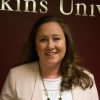When Shannon Majoros entered college, her career had already been determined. She would go to law school and become an attorney, like her great-grandfather, great-uncle, grandfather, uncles and several cousins before her. But then she met Annie.
In her sophomore year, Majoros took a job as a part-time aide, working with a local family whose daughter had autism. She was unfamiliar with the disorder and had no idea what to expect. When she met Annie, the child didn’t speak. She made high-pitched sounds and would flap her hands, spin herself around and tap her head on different surfaces.
Her first two days on the job were overwhelming. “There was no briefing or PowerPoint presentation to review beforehand,” said Majoros, now the director of programming for the RISE of Autism Foundation and an adjunct faculty member at the School of Education, “It was on-the-job training. We were expected to perform right away.”
Working with a consultant hired by the family, Majoros started undertaking very simple tasks with Annie and worked up to more complex ones. The goal was to reward Annie for positive changes in her behavior through a process called Applied Behavior Analysis (ABA). ABA is seen as one of the most effective tools in improving the functioning of children with autism.
“ABA seeks to increase appropriate behaviors that we hope to see more of and decrease those we want to see less of.”
The consultant taught Majoros how to get Annie to respond to simple commands. “It was my responsibility to work with her until she understood the concepts. We would keep repeating tasks until they were mastered and then move on to the next one.”
By the time Majoros finished the undergraduate program in 2000, she could see a substantial change in Annie.
“Annie was verbal where she wasn’t before. The family could now take her into the community without fear of her having a tantrum. She could attend preschool, with the support of an aide and be around other children.”
Majoros realized her own life had been changed, and the change in Annie’s behavior affected the family’s interaction in such a meaningful way.
“I realized how important this work was not only to the child, but every member of the family.”
It became her life’s work. Majoros recently received an award from a citizen group in Howard County for her outstanding service to students with autism. It was the sixth time in the past 10 years she has been honored by the Special Education Citizen Advisory Committee. She has also been recognized as Special Education Teacher of the Year by the Community Services for Autistic Adults and Children.
After accepting a teaching position at a nonprofit agency in Montgomery County, she enrolled in SOE’s master’s degree of special education. “My friends and professional colleagues all said Hopkins had the best program and instructors. I continued to learn about evidence-based practices that enhanced my teaching.”
In 2007, Majoros was appointed autism specialist for Howard County Public Schools. Her duties included training special education teachers and providing direct classroom support and instructional programming for students with autism.
In 2014, the school system asked Majoros to create a program for students needing more intensive services. These students were being bused, sometimes as long as 90 minutes, to nonpublic programs. The county wanted to create the same level of intensive instruction through an in-house program.
“The Cornerstone Project became my life’s work. It’s a very intense ABA program for students who are not making progress in traditional special education settings.”
Majoros started work on Cornerstone about the same time that the School of Education first offered the Post-Master’s Certificate in Applied Behavior Analysis. Johns Hopkins is the only school to offer this graduate certificate in Maryland.
“I had been looking for an advanced ABA program for some time,” she said. “I was so excited when Dr. Tamara Marder told me that Hopkins was going to be offering the program. The timing coincided perfectly with my work in Howard County. ”
At the RISE for Autism Foundation, where she started working last year, Majoros consults with the county on Cornerstone. She is also planning a new program for older children. “Most ABA programs are intended for students up to the third grade. There’s not much available for the older kids, but the need for ABA doesn’t end at 10 years old.”
Last summer, Majoros, who spent 18 years serving students with disabilities, was invited back as an adjunct faculty member at SOE. She is teaching two classes in the autism certificate program and providing university supervision for graduate interns.

